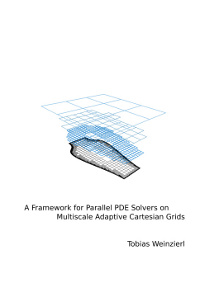PhD and habilitation thesis

My dissertation introduces a piece of software called Peano which is a certain way how to model tree-based adaptive Cartesian meshes and to arrange all data therein within stacks. That is: you can only run through this mesh in a depth-first manner along the Peano space-filling curve (SFC), but in return you use only data structures which are a fit to modern architectures as they are intrinsically cache optimal. Furthermore, you can encode a lot of adjacency and spatial information within the automaton which realises the traversal. So the memory footprint is relatively small. My software is not the first of its kind: there’s been a whole set of Peano codes at TUM at the time I started my research, but they all explored different avenues, and their core algorithm had been way more complicated than my approach: Indeed, they had to work with a number of stacks which is exponential in the spatial dimension d, whereas my algorithm is linear in d.
Part two and three of the thesis then use this tree traversal and stack paradigm to show how you can realise a multigrid algorithm on top of it which works totally matrix-free, and how you can parallelise this code based upon a multiscale generalisation of non-overlapping domain decomposition.
I call the resulting software Peano’s second generation. The first generation is the aforementioned set of codes. So this had been the first time, a lot of different Peano SFC ideas were condensated into one piece of code.
Nowadays, the book is available free of charge as
Obviously, you can still try to buy it from the publisher.
My habilitation extended the concepts of the PhD and also delivered a complete rewrite of Peano. I call this the third generation. it is also the generation you find in projects like ExaHyPE. The habilitation itself is cumulative, i.e. a collection of papers, but I wrote a rather long overview and contextualisation of these papers. While I cannot upload the papers themselves here (though most of them are gold access), you can download the habilitation’s intro here:

- Meeting with other TOMS (associate) editors at #SIAMPP26. It is always good to meet the people behind a journal portal.
- My #SIAMPP26 quote of the day: "It's the wrong name, but it's my code so I can call it whatever I want".
- The official leaflet for #PPAM26 is out: https://ppam.edu.pl/docs/PPAM2026-CALL_A4.pdf Great to see two @cake-dri.bsky.social CoLs on the list of invited speakers.
- 2hrs in at #SIAMPP26 and a first talk using ExaHyPE. The observations re precision are interesting. Punchline: low precision pollutes a lot of the outcomes and one has to be very very careful using it.
- Happy to be in Berlin for #SIAMPP26